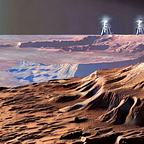The Future of Clean Water: Revolutionizing Desalination with Artificial Intelligence
Introduction: The Future of Clean Water
As the world’s population continues to grow and climate change exacerbates water scarcity, finding innovative solutions to secure a sustainable supply of clean water has become a pressing global concern. One promising answer to this challenge lies in desalination, a process that converts seawater into freshwater, making it suitable for human consumption and agricultural use. The future of clean water will be shaped by the intersection of artificial intelligence (AI) and desalination, revolutionizing the way we produce and manage our most precious resources.
The Current State of Desalination
Desalination has been around for decades, but its widespread adoption has been hampered by the high energy consumption, cost, and environmental impact associated with the process. Traditional desalination methods, such as reverse osmosis and distillation, are energy-intensive and can generate significant amounts of greenhouse gas emissions. Additionally, the disposal of the concentrated brine produced during desalination can harm marine ecosystems.
However, recent advances in technology, particularly the advent of AI, have the potential to transform desalination into a more efficient, affordable, and environmentally friendly solution for our growing water needs.
How Artificial Intelligence is Revolutionizing Desalination
AI is poised to reshape the future of clean water by optimizing desalination processes and reducing their environmental footprint. Here are a few ways AI is making a difference:
- Energy Efficiency: AI can optimize the energy consumption of desalination plants by monitoring and adjusting system parameters in real time. This not only reduces the energy required but also lowers operating costs and greenhouse gas emissions.
- Predictive Maintenance: AI can predict and identify potential equipment failures and maintenance issues, allowing plant operators to address problems before they escalate. This helps to minimize downtime and maintain consistent water production levels.
- Process Optimization: By analyzing vast amounts of data from sensors and equipment, AI can identify patterns and trends that can be used to optimize the desalination process. This can lead to improved efficiency, reduced waste, and better water quality.
- Environmental Monitoring: AI can help mitigate the environmental impact of desalination by monitoring and managing the discharge of brine into the ocean. AI can also be used to predict and minimize the effects of desalination on marine life and ecosystems.
The Future of Clean Water: AI-Driven Desalination Projects
Several pioneering projects are already demonstrating the potential of AI-driven desalination to address global water challenges. For example, researchers at the Massachusetts Institute of Technology (MIT) have developed a solar-powered, AI-controlled desalination system that can provide clean water to remote, off-grid communities. The system uses machine learning algorithms to optimize energy usage and water production, making it more efficient and cost-effective than traditional desalination methods.
Another promising project is the collaboration between WaterFX, a California-based water technology company, and Google’s DeepMind. The partnership aims to develop an AI-driven desalination system that uses solar energy and advanced filtration techniques to produce clean water with minimal environmental impact.
Conclusion: Embracing AI for a Sustainable Water Future
The future of clean water depends on our ability to harness the power of artificial intelligence to revolutionize desalination processes. By making desalination more efficient, affordable, and environmentally friendly, AI can help address the pressing water challenges facing our planet. As we continue to invest in AI-driven desalination projects and technologies, we move closer to ensuring a sustainable, clean water supply for generations to come.
Like the article? Don`t forget to follow us on Medium! Also interesting content on our Instagram, Facebook, and Twitter!
